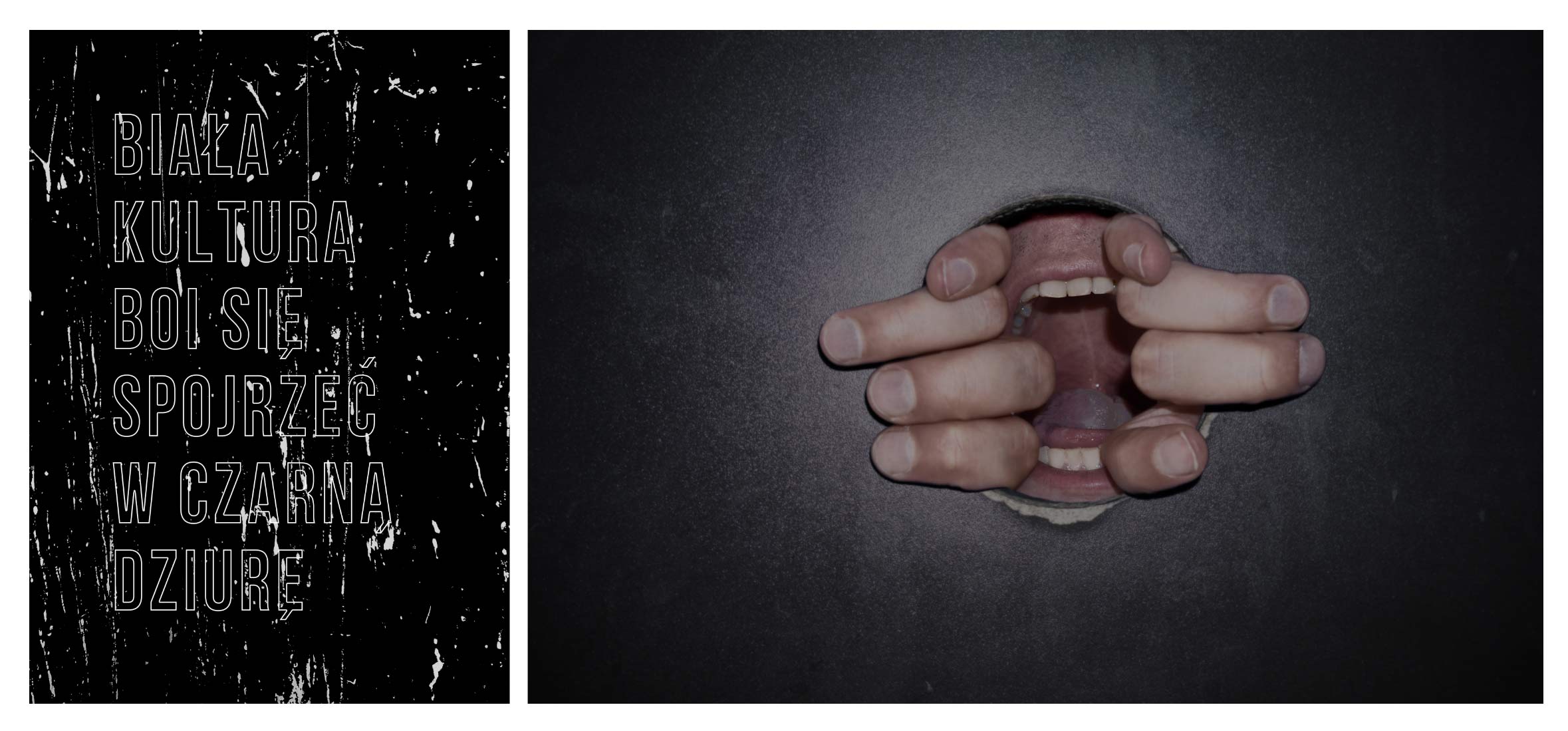Group exhibition:
ID: E20.4
Title:
We Are People
Date:
June 24 — October 11, 2020
Place:
Galeria Labirynt, Lublin, Poland
Curator:
Waldemar Tatarczuk
Artists:
Archiwum Protestów Publicznych (Agata Kubis, Marta Bogdańska, Karolina Sobel, Adam Lach, Chris Niedenthal, Wojtek Radwański, Rafał Milach), Mirosław Bałka, Edna Baud, Anatoly Belov, Pamela Bożek, Przemek Branas, Karolina Breguła, Ivan Davydenko, Ewa & Adele, Sean Fader, Ludomir Franczak, Gabryś the Prince, Daniil Galkin, Martyna Gart, Jakub Gawron, Gilbert and George, Wojciech Gilewicz, Mikołaj Grabowski, Igor Grubic, Aleksandra Ignasiak, Bartosz Jakubowski, Marta Jalowska, Anna Jankojć, Marcin Janusz, Edka Jarząb, Sara Herczyńska, Łukasz Horbów, Nikita Kadan, Kamil Kak, Anton Karyuk, Anastasia Kashtalian, Filip Kijowski, Bartek Kiełbowicz, Łukasz Konieczny, Paweł Korbus, Jerzy Kosałka, Daniel Kotowski, Jan Kowal, Grzegorz Kozera, Kornel Leśniak, Paweł Leszkowicz i Tomasz Kitliński, Krystian Lipiec, Izabela Maciejewskia, Marta Maliszewska, Jarosław Mankiewicz, Krzysztof Marchlak, Rafał Milach, Kei Miller, Danuta Milewska, Anna Nawrot, NO_PIC_NO_CHAT, Anna Nowakowska, Krzysiek Oleksiak, Maciej Pałka, Magda Piekarska, Liliana Piskorsk, Liliana Piskorska, Jacek Poniedziałek, Gabryś the Prince, Karol Radziszewski, Józef Robakowski, Daniel Rycharski, Sergey Shabohin, Alicja Sienkiewicz i Kaja Zmysłowska, Karolina Sobel, Magdalena Sobolska, Bart Staszewski, Przemysław Stefaniak, Syreny TV (Ewa Majewska, Aleka Polis), Elwira Sztetner, Agata Sztorc, Tajskie Kwiatuszki (Barbara Gryka i Filip Kijowski), Mariusz Tarkawian, Waldemar Tatarczuk ft. Agata Wiatr, Mariusz Tarkawian, Paweł Tomaszewski, Grzegorz Tomczyk, Filip Tułak, Maciej Tuora, Katarzyna Tużylak, Sebastian Winkler, Bartosz Wójcik, Katarzyna Wójtowicz, Bożna Wydrowska, Katarzyna Wyszkowska, Monique Yim, Hubert Znajomski, Paweł Żukowski
Niezrzeszeni Studenci (Julia Adamska, Monika Bryk, Joanna Bury, Roberto Cura, Kamil Druk, Krzysztof Fischer, Weronika Guenther, Marta Jabłońska, Marta Kaczmarek, Sonia Kaźmierczak, Joanna Klikowicz, Mateusz Kowalczyk, Rafał Kruszka, Anna Nowakowska, Anna Olejarczyk, Paweł Olejnik, Krzysztof Oleksiak, Oskar Pawełko, Zuzanna Pietruszewska, Julia Podborączyńska, Aleksandra Sieczko, Katarina Šimeková, Julianna Wińczyk, Weronika Zalewska)
Niezrzeszeni Studenci (Julia Adamska, Monika Bryk, Joanna Bury, Roberto Cura, Kamil Druk, Krzysztof Fischer, Weronika Guenther, Marta Jabłońska, Marta Kaczmarek, Sonia Kaźmierczak, Joanna Klikowicz, Mateusz Kowalczyk, Rafał Kruszka, Anna Nowakowska, Anna Olejarczyk, Paweł Olejnik, Krzysztof Oleksiak, Oskar Pawełko, Zuzanna Pietruszewska, Julia Podborączyńska, Aleksandra Sieczko, Katarina Šimeková, Julianna Wińczyk, Weronika Zalewska)
Work:
Explication:
Is it necessary in the 21st century to keep repeating that a human being is a human being regardless of their origin, skin colour, gender, sexual orientation or any other traits? The answer to this question no longer seems obvious when the president of the country states: “They are trying to persuade us that LGBT are people, but it’s an ideology”, and his electoral campaign staff member adds: “Let’s protect ourselves from LGBT ideology and let’s stop listening to these idiocies about some human rights, or some equality. These people aren’t equal to normal people, end of discussion.”
The exhibition “We Are People” reacts to the current developments and threats that they entail. When leading politicians make statements that challenge the inherent equality of all people and question what should remain unquestioned, it is hard to remain indifferent. “Auschwitz did not fall suddenly from the sky”, as the historian, journalist and former concentration camp prisoner Marian Turski remined us in his recent speech. It began with small, seemingly innocent steps, such as the so-called “ghetto benches” for Jews at universities. Thus, slowly and silently, evil creeped in, adopting its most gruesome form. A classroom bench – nothing serious, after all, we can pretend nothing is happening and carry on living… Later came the ban on using swimming pools, shops, public places… We know all too well how it ended.
We are currently turning a blind eye on many hateful statements from politicians, laying the blame, for example, on the heated public debate on the eve of the elections. When we fail to protest, we come to terms with such statements, we let them exist. “Monsters exist, but they are too few in number to be truly dangerous. More dangerous are the common men, the functionaries ready to believe and to act without asking questions” – wrote Primo Levi. A treatise on the banality of evil was penned by Hannah Arendt. Her words still ring true: “Evil is banal because it may go unnoticed, one may not think about it, it can be multiplied infinitely while concentrating on something else.”
The exhibition “We Are People” reacts to the current developments and threats that they entail. When leading politicians make statements that challenge the inherent equality of all people and question what should remain unquestioned, it is hard to remain indifferent. “Auschwitz did not fall suddenly from the sky”, as the historian, journalist and former concentration camp prisoner Marian Turski remined us in his recent speech. It began with small, seemingly innocent steps, such as the so-called “ghetto benches” for Jews at universities. Thus, slowly and silently, evil creeped in, adopting its most gruesome form. A classroom bench – nothing serious, after all, we can pretend nothing is happening and carry on living… Later came the ban on using swimming pools, shops, public places… We know all too well how it ended.
We are currently turning a blind eye on many hateful statements from politicians, laying the blame, for example, on the heated public debate on the eve of the elections. When we fail to protest, we come to terms with such statements, we let them exist. “Monsters exist, but they are too few in number to be truly dangerous. More dangerous are the common men, the functionaries ready to believe and to act without asking questions” – wrote Primo Levi. A treatise on the banality of evil was penned by Hannah Arendt. Her words still ring true: “Evil is banal because it may go unnoticed, one may not think about it, it can be multiplied infinitely while concentrating on something else.”
Link:
